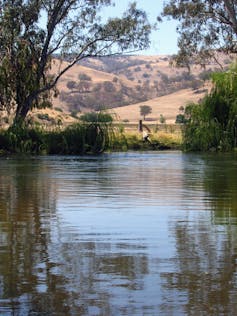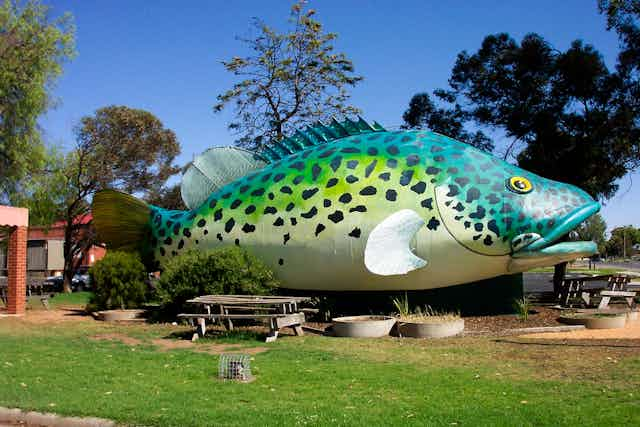Let’s imagine for a minute that a Murray cod – let’s call him Mac Peelii - replaced Tony Burke as water minister, responsible for the Murray-Darling Basin. Apart from the obvious issues associated with having an aquarium for an office, and the lack of opposable thumbs for holding telephones, how would Mac return the Murray-Darling Basin’s rivers to a state that would make him, his families and friends happy and healthy?
Firstly, Mac would be keen to see the whole Basin considered as one interconnected system, comprising many interdependent components, and involving upstream-downstream, and main channel-to-floodplain periodic connections, mediated by water.
Being the top predator in the system, he relies on many smaller animals – like other fish, yabbies, shrimp, mussels and water birds – and plants to sustain his large size. He would reciprocate by contributing to a diverse ecosystem: largely through his feeding, but also through his movement, “nest” making, territorial behaviour and other activities.
Indeed, all of the food web that sustains Mac and his like, relies on the fact that rivers operate as systems and not discrete units that have been separated by weirs, regulators and levee banks.
He’d especially want to see the river flood occasionally, not because he would move on to the floodplain himself (he, after all, sticks to the main channel), but because floods let smaller species of fish, on which he feeds, move among billabongs. Floods also bring a burst of productivity, some of which makes its way back to the river as a source of river energy.

Mac would also go into bat (another problem for an animal lacking opposable thumbs) for the restoration of the natural, seasonal cycle of high winter/spring flows, and low summer/autumn flows. This cycle previously characterised the Murray River. He’d argue that the winter/spring flows would allow him to cruise up and down the river wherever he wanted to go; exploring, feeding, finding a new territory that is sure to attract a qualified mate, and allow him to breed with a different female each year so that his genes would get nicely mixed.
Of course, he would not expect to be able to move around wherever he wanted at all times of the year, because summer low-flows would be when his river would normally dry to a series of pools, interspersed with shallow flowing stretches. But this would also be the time when his babies would grow fast in warm water, fed by a rich soup of invertebrates and small fish. Mac himself would sit in a deep pool under a large fallen tree, conserving energy and hoping not to get caught by some wily angler.
And so, Mac would hold up one fin and emphatically state that he didn’t want the rivers to be used as “water highways”, where managers move water downstream as fast and efficiently as possible. Instead, he’d argue that the cold water rushing from the bottom of dams was making him and all of the other fish lethargic, unable to compete with the introduced, cold-water-adapted trout, and unable to grow or breed successfully. And if he and his fellow Murray cod did breed, Mac’s babies would be washed by those releases out of the nest before they were ready to leave, and be swept to an uncertain fate.
He’d also point out that maintaining high flows in rivers was causing erosion and destroying important habitat for him and his riverine colleagues. Permanently flooding wetlands that would normally dry periodically was causing acid-sulphate catastrophes, where the only life that can survive is organisms that thrive in the equivalent of battery acid.

Mac would also instruct water managers to change the way his rivers are managed in times of drought. While many rivers - like the Murray and other “water highways” - continued to have substantially higher flows going down them than would be natural during drought, and you’d think that the persistence of water during such extreme periods would generally be welcome. But rivers such as these help alien species, like carp, hang on, when in drought-affected rivers, they suffer more than native fish. Indeed, Mac’s experience in the recent millennium drought suggested that he and many of his native fellow river-dwellers survived quite well in those rivers that had long, dry spells; indeed, some flourished. Sure, there were local extinctions of native species. But these are only a worry - Mac argues, thumping one great fin on his desk - because dams and weirs prevent recolonisation, and fishing can continue unabated, no matter how much fish struggle under difficult environmental conditions.
Eventually the rains fall again, either during the drought or as it is breaking, and this is where Mac would like to focus his fishy attention. Rather than capturing all the runoff in near-empty dams, waiting for them to fill again and thus prolonging the riverine drought by weeks or even months, he would recommend that a substantial proportion of the runoff be released straight away. This might prevent “blackwater” events (where anoxic water builds up because of decomposing organic material in previously dry rivers and floodplains) and allow fish to move into more favourable habitats sooner.
Our new water minister, Mac Peelii, knows that his concerns about the management of the rivers of the Murray-Darling Basin will be met by scepticism and opposition from many involved with exploitation, management and even conservation of the Basin’s water resources. But micro-managing the Basin’s water, whether for irrigation or conservation, is a risky business for all sorts of reasons and is at odds with how the Basin’s ecosystem has survived and flourished for millennia.
Mac’s ideas undoubtedly swim against the current of popular opinion, but he believes that we need to dive into the water with our eyes well-and-truly open, despite the discomfort it causes, rather than just go with the flow. Having survived this long in a harsh environment, political and otherwise, Mac isn’t about to turn belly-up just yet. He has a few more ideas he wants to communicate … before he makes a move on the PM.

